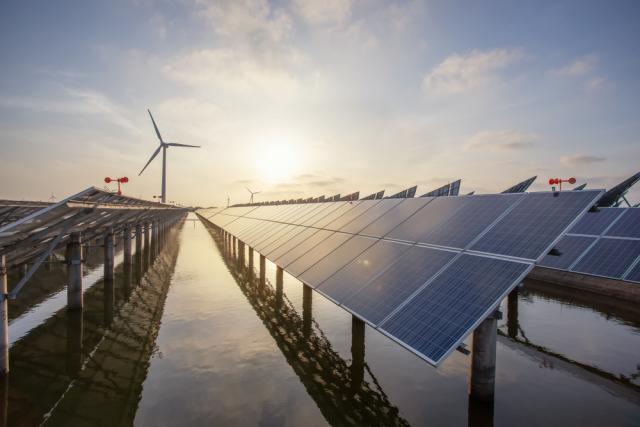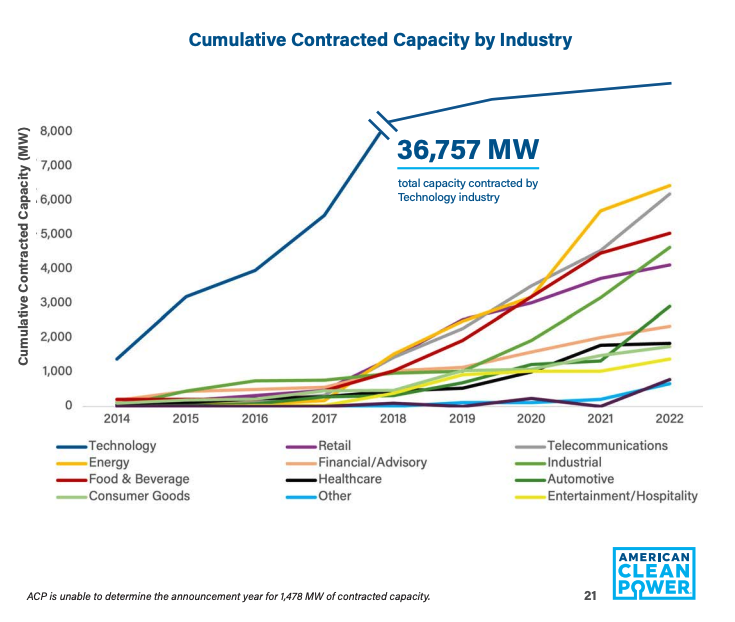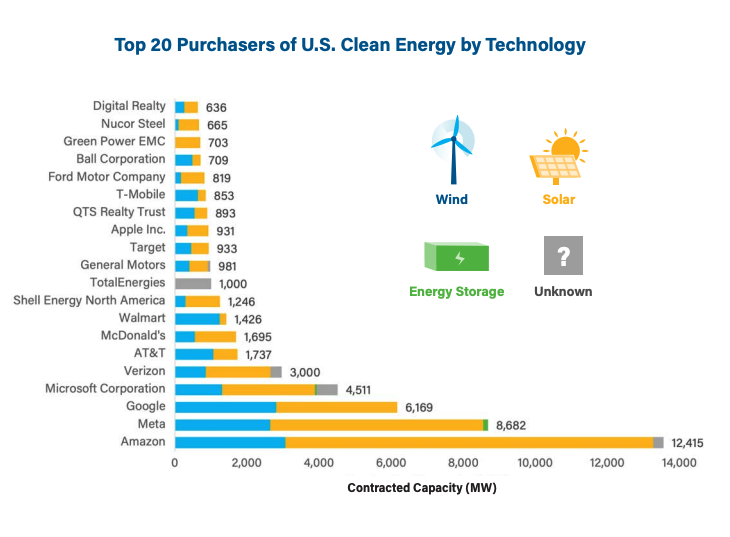
Having a corporate buyer for clean power projects, such as solar, wind and energy storage, could prevent about 47 million metric tons of CO2 from being emitted annually, according to the ACP. (Source: Shutterstock)
Companies looking to power operations from renewable energy sources pushed clean energy power purchases to new heights last year.
Combined, 326 companies—led by tech giants Amazon, Facebook’s parent company Meta and Google—contracted 77 gigawatts (GW) of clean energy by year-end 2022, according to a recent report by the American Clean Power Association (ACP).
“Economic and environmental benefits, as well as growing pressure on corporations to meet sustainability targets, have led to a 100-times increase in corporate clean power procurement over the past decade,” JC Sandberg, interim CEO and chief strategy officer for ACP, said in a statement. “During that same period, solar and wind costs have decreased 71% and 47% respectively, making both more attractive to corporate energy buyers.”
Having a corporate buyer for clean power projects, such as solar, wind and energy storage, could prevent about 47 million metric tons of CO2 from being emitted annually, according to the ACP. That’s equivalent to one year’s worth of emissions from 10 million gasoline-powered passenger vehicles.
While the technology sector is the largest buyer of clean energy, other industries are making progress. These include the energy industry, which at 6.7 GW has the second highest clean power capacity contracted.

“Between 2014 and 2017 procurement activity slowed but picked up to nearly 1.3 GW on average each year from 2018 to 2022,” the report stated. “Companies that have historically been focused on petroleum and oil, such as Shell and TotalEnergies, now have contracts in place for over a gigawatt of clean energy.”
Leading the pack
Amazon ranked as the top corporate purchaser of clean energy globally, contracting nearly 12.4 GW through September 2022. The online retail powerhouse aims to power 100% of its operations with renewable energy by 2025—five years ahead of its original target. The report pointed out that Amazon announced 11 GW of new power purchase agreements (PPA) between 2020 and 2022.
In September 2022, Amazon reported having about 380 renewable energy projects—including 154 wind and solar farms and 225 rooftop solar projects—across 21 countries with a renewable energy capacity of 18.5 GW.
Other tech titans followed, with Meta in second with 8.7 GW contracted and Google with 6.2 GW, according to the report. With 4.5 GW contracted, Microsoft remains behind the top three.
“Meta, the second largest clean power purchaser, has, on average, announced over 940 megawatts of new clean power procurement each year since 2013,” according to ACP. “Google, one of the earliest adopters of clean power, had a slow year of procurement in 2021 but rebounded in 2022 with more than 940 MW.”
Together, the technology industry contracted nearly half of the 77 GW bought by companies.
Energy industry adds renewable power
The oil and gas sector came in a distant second to tech, with 6.7 MW contracted.
Between 2018 and 2022, the rate of procurement by the energy industry increased to nearly 1.3 GW on average each year.
“Shell leads the 35 energy companies buying clean power with 1.2 GW announced,” ACP said in the report. “The oil, petroleum and gas industries now have contracts in place for 4 GW of clean energy, accounting for 60% of total capacity contracted by energy companies.”
Shell is among energy companies that are targeting net-zero emissions by 2050. Its strategy includes reducing emissions from its own operations, including oil and gas production, as well as providing more low-carbon energy such as electricity generated from wind and solar and charging for electric vehicles.
Texas is renewable power’s top destination
In addition to being the top oil-producing state, Texas is also home to the most clean-energy power projects contracted to commercial and industrial (C&I) buyers.
The report shows Texas, which has a C&I contracted capacity of 27,198 megawatts (MW), accounts for 35% of contracted capacity and 20% of projects.
Texas has more wind energy capacity than any other state in the U.S. One of the world’s largest-capacity wind farms is located in Texas. Owned and operated by RWE Renewables, the 627-turbine Roscoe Wind Farm has a total installed capacity of about 782 MW.
The company’s 200-MW El Algodon Alto, located in San Patricio County, Texas, started operations in 2022.
“Texas might be the home of the oil and gas industry, but it is fast becoming the leading state to buy clean energy to power business activity,” Sandberg said. “Corporate demand for clean energy is a key driver for wind, solar and battery storage development. Even traditional oil and gas companies now recognize the value of clean energy for their operations, making the energy sector the second-largest industry for clean power purchases.”
Illinois and Ohio followed Texas in the amount of corporate contracted clean power by state.
Solar plus storage
Of the renewable energy choices, ACP data shows corporate buyers—including leading tech companies— preferred solar projects.
At more than 10 GW, Amazon led in total solar capacity contracted.

“Corporate buyers contracted an average of 88 MW of solar capacity per offtake agreement,” according to the report. The average offtake capacity has increased significantly over time, averaging 55 MW for announcements in 2015, and up to 139 MW of announcements in 2022.”
Utility-scale solar is becoming more attractive as it’s coupled with storage.
Though such corporate deals are limited, the report noted they are beginning to gain popularity.
“Pairing solar with storage allows C&Is to benefit from firmed generation,” ACP said. “Online solar-plus-storage capacity has nearly quadrupled over the past five years and the list of solar-plus-storage projects in the pipeline swells.”
One of the biggest solar and battery energy storage projects is being developed in Nevada’s Mojave Desert. Once completed, Primergy Solar’s $1.2 billion Gemini will be one of the largest solar plus storage projects in the U.S. with a 690-MWac solar array and 1,416 megawatt-hour storage capability.
At 1,100 MW, Amazon also contracted the most solar plus storage capacity, the report showed. It was followed by TotalEnergies at 1,000 MW, and Meta with 615 MW.
Recommended Reading
Energy Transition in Motion (Week of Sept. 20, 2024)
2024-09-20 - Here is a look at some of this week’s renewable energy news, including funding for a direct lithium extraction project in Arkansas.
‘Misguided’ Approach to Energy Transition Threatens Energy Security
2024-09-18 - International Energy Forum Secretary General Joseph McMonigle says a single, linear pathway to the energy transition is “misguided and an outdated approach.”
Honeywell, SAMSUNG E&A to Collab on CCUS Solutions
2024-09-18 - SAMSUNG E&A will leverage Honeywell's carbon capture technologies, in particular Honeywell’s advanced solvent carbon capture technology.
Despite Progress, Hydrogen Faces ‘Sobering Realities’
2024-09-18 - A $335 billion investment gap may put 2030 targets toward net-zero ambitions in jeopardy.
Shell Taps Advanced Ionics for Electrolyzer Pilot Project
2024-09-17 - Part of Shell’s GameChanger program, the pilot project is intended to help scale Advanced Ionics’ Symbion electrolyzer technology and move it toward commercialization.
Comments
Add new comment
This conversation is moderated according to Hart Energy community rules. Please read the rules before joining the discussion. If you’re experiencing any technical problems, please contact our customer care team.






